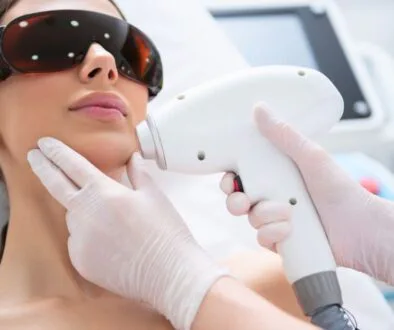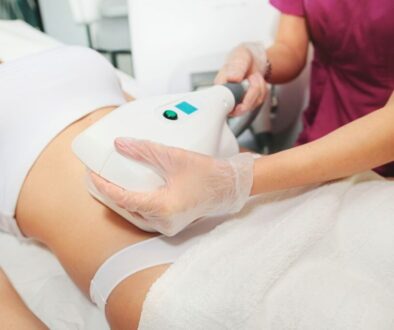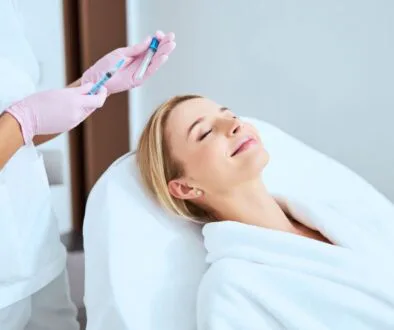Should You Get A Photofacial Treatment?

Published June 27, 2021
If your skin is damaged from the sun, has red spots, and other skin pigment issues, it is highly recommended that you get a photofacial treatment. This type of treatment may be costly and may require some patience before you actually see some improvements in your skin. Stay tuned for more details before booking your photofacial appointment with your preferred clinic!
Defining Intense Pulsed Light (IPL) Photofacial
A new technology called Intense Pulsed Light (IPL) Photofacial is invented to treat pigment issues, sun damage, red spots, and Rosacea. The technique is carried out by allowing the light to travel into the epidermis, producing cells and eliminating the uneven skin pigment.
What Does IPL Photofacial Treat?
IPL facials treat several skin issues such as:
- Brown and Red Spots
- Freckles
- Sun Damage
- Spider Veins
- Redness
- Rosacea (enlarged facial blood vessels)
- Pigment Imperfections
How Does IPL Treatment Work?
IPL uses light of various wavelengths to guide and target the skin’s pigment-generating cells that are just under the skin’s surface. The light produced by the handheld device is transformed to heat energy that kills the hyperactive melanin generating cells in your skin, then dispersing the pigmented portions of your skin.
Who Is/Is Not Good Candidates for IPL Photofacial Treatment?
The following is a list of those who are not eligible to undergo IPL Photofacial:
- People with a high Fitzpatrick score
- Tanned bodies
- People with melasma
Light rays tend to attract pigment, so people with darker skin tones might actually have their skins discolored while the melasma patches turn lighter.

How Many IPL Photofacial Treatments Do I Need?
It is typically recommended that you undergo the following treatment at least three to five times with a four-week difference. You may also be advised to go back every once in a while for a maintenance treatment. Multiple treatments will treat skin better and give the best results.
What Areas Are Best For IPL Photofacial?
The following is a list of areas that are best to target when undergoing an IPL photofacial:
- Face
- Neck
- Chest
- Shoulders
- Arms
- Hands
- Legs
Is IPL Treatment Painful?
It is not painful, but it may be an uncomfortable process for some since it will feel like needles pricking into the deeper layer of the skin. The device’s light also produces an intense amount of brightness which may cause some patients to get irritated or uncomfortable, especially those with light sensitivity.
How Long Is The IPL Photofacial Appointment?
Every person has a different number of spots on their skin that need to be addressed. This simply implies that the length of time required to complete one treatment session will always be determined by how long the aesthetician spends passing through a region of your body. Plus, the number of areas that need to be treated. It would take roughly 45 minutes to perform an IPL Photofacial on the face, with little to no downtime.
How Long Do IPL Photofacial Results Last?
Improvements usually show around three months after the last treatment session you had. Although, sometimes it may take a little while or sometimes even a lot faster than expected. Either way, your skin’s improvement will be evident over time after a few months; this is a benefit of IPL laser treatment. Do note that it is better not to stay a lot under the sun and always use protection against the sunlight as it may damage your skin and potentially bring back old spots and freckles.
What Happens During IPL Photofacial Appointment
Your skin should be clean when you arrive at the clinic before the cosmetic procedure so that the aesthetician does not have to do much effort cleaning it. By that time, he/she can quickly apply a cold gel to your skin, which will improve the effectiveness of the handheld device’s light waves. Depending on your needs, the aesthetician may go over the spot several times, moving the laser across the skin as the light flashes on it during the whole procedure.
What Happens After Getting An IPL Photofacial
After the process, the aesthetician will clean your skin again and remove the previously applied gel. As a result of the treatment, your skin will look slightly swollen and red. However, you can conceal the redness by adding cosmetics to your skin immediately after the treatment. Remember to stay out of the sun to prolong results as much as possible and always use sunscreen protection.
Common Concerns for IPL Laser Treatment
Every choice you make is regarded as a risk. This is why, in the long run, it is critical to commit to a single trustworthy clinic and an experienced aesthetician or plastic surgeon. Moreover, melasma patients will notice darkening in some areas of their skin if they still choose to undergo the procedure, which is why it is critical to determine first if you are qualified for the treatment.
Undergoing a photofacial treatment is a skin rejuvenator as it will treat your skin to go back to its original clear and smooth state. But remember to consult your aesthetician first if your skin is okay to go through the laser light treatments since some skin types may be sensitive to the handheld devices and might only add more issues to the skin than treating only one type of skin condition.
We Are A Medical Beauty Spa In Boca Raton Florida
Four Seasons Laser Center is a highly renowned med spa in Boca Raton Florida. Our state of the art equipment is run by highly trained and experienced staff so you can rest assured that you are in good hands. We offer laser hair removal services for your whole body, PDO Threads facelift, safe and effective Plasma Fibroblast skin tightening, and other advanced medical beauty services to help you look your best. Contact us now to book a free consultation.

Fact Checked By Experts
This content has been thoroughly fact-checked by our team of internal experts. For further information regarding the editorial standards we adhere to, please click here.

About The Author
Krizzia Paolyn is a professional writer for several reputable digital magazines and publications. It has always been her passion to share her voice, and at the same time, to encourage other people to speak up. She has a bachelors degree in Psychology.


